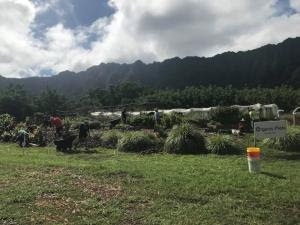By Staff Reports
(Hawaii)– A health research project connecting Waimānalo community members with public health and food-system researchers from the University of Hawaiʻi at Mānoa has proven successful because of strong community participation, according to two new publications. Rooted in relationship building, participatory research, and Native Hawaiian values, the Waimānalo Pono Research Hui (WPRH) could serve as a model for other research efforts, according to the authors.
“There is a long history of ‘helicopter research’ by scientists considered outsiders to communities that has led to exploitation and ethical breaches,” said Jane Chung-Do, co-founder of the WPRH and associate professor in the Office of Public Health Studies (OPHS) in the Myron B. Thompson School of Social Work.
“The WPRH has provided a space for academics to learn how to listen to the community and appreciate the wealth of cultural knowledge that shapes the experiences of that community,” added Samantha Keaulana, current PhD student in public health and a WPRH member.
Building Capacity and Relationships
In one of the new studies, Chung-Do and her co-authors described the development of WPRH in the predominantly Native Hawaiian community of Waimānalo. Established in 2017, the hui built on a decade-long relationship between Chung-Do and a community leader from Waimānalo, Ilima Ho-Lastimosa. Ho-Lastimosa is the UH Mānoa College of Tropical Agriculture and Human Resources’ Community Coordinator at the Waimānalo Learning Center, which hosted the early WPRH meetings and continues to serve as a venue for the group.
Through a series of community gatherings, WPRH identified three interconnected priorities: lā‘au lapa’au (traditional medicine), ‘ai pono (healthy eating), and limu (seaweed) restoration. These priorities have since evolved into several community-driven initiatives, and today, the hui has more than 50 active members.
In the new paper, published in the American Journal of Community Psychology, the researchers identified trust building, creation of shared values and spaces, self-reflection, and a focus on families as critical to this success.
Protocol to Support Pono Research
In the other new study, Keaulana and her co-authors described how they created protocol to support transparent research efforts within the hui. A collaborative process between academic and community participants helped to develop a research proposal and determine data ownership.
The researchers noted that their work resonated with research approaches in other Indigenous communities. The paper was published in a special issue of the British Journal of Social Work that focused on indigenous peoples and the social determinants of health and featured community-academic and inter-disciplinary research. The issue included studies that used participatory methods that wove indigenous ways of knowing, being, and doing with contemporary innovations. Lana Kaʻopua, formerly a professor with Myron B. Thompson School of Social Work, was a guest editor on this special issue.
“The history of Waimānalo’s colonization and militarization is shared by Native Hawaiians statewide and indigenous people globally. Every step in the development of the WPRH and its protocol and rules of engagement aimed to be pono,” Ho-Lastimosa said.
All co-authors on the studies are members of WPRH and include Ho-Lastimosa, Phoebe Hwang and Theodore Radovich of UH; Kenneth Ho Jr. of the University of Southern California; and Luana Albinio, Ikaika Rogerson, LeShay Keliʻiholokai and Kirk Deitschman of Ke Kula Nui O Waimānalo.

